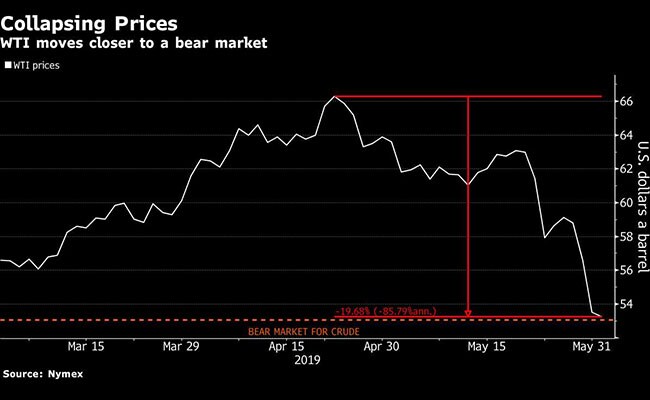
Oil steadied after plunging 10 per cent in four days as investors weighed the prospect of a sharp slowdown in global economic growth due to trade frictions against Saudi Arabia's pledge to maintain market stability.
Futures in New York were little changed after falling as much as 0.7 per cent earlier. JPMorgan Chase & Co. said Monday the chance of a U.S. recession in the second half had risen to 40 per cent from 25 per cent a month ago. Vitol Group, the world's largest oil trader, expects OPEC and its allies to roll over output targets that expire in June after Saudi Energy Minister Khalid Al-Falih said Monday he was committed to doing whatever it takes to stabilize markets.

Oil has fallen almost 20 per cent from a peak in late April, taking it to the brink of a bear market, as trade relations between Washington and Beijing deteriorated and the White House announced tariffs on Mexican goods. Rising U.S. inventories and relative calm in the Middle East over the last week or so are countering the likelihood that the Organization of Petroleum Exporting Countries and allied producers will extend their output curbs.
"That the Saudi energy minister's remarks failed to boost crude prices suggests investors are focusing on trade tensions and U.S. oil," said Satoru Yoshida, a commodity analyst at Rakuten Securities Inc. in Tokyo. Unless there's a new geopolitical threat, such as a missile attack in the Middle East, West Texas Intermediate crude could drop below $50 a barrel before OPEC decides on whether to extend the production cuts, he said.
WTI fell 10 cents, or 0.2 per cent, to $53.15 a barrel on the New York Mercantile Exchange at 9:57 a.m. in Singapore after falling as much as 39 cents earlier. The contract closed down 25 cents to $53.25 on Monday, taking its decline since its April 23 high to 19.7 per cent.
Brent for August settlement dropped 20 cents to $61.08 a barrel on London's ICE Futures Europe exchange. The contract dropped 71 cents, or 1.2 per cent, to $61.28 on Monday. The global benchmark crude was trading at a premium of $7.84 to WTI for the same month.
Essential Business Intelligence, Continuous LIVE TV, Sharp Market Insights, Practical Personal Finance Advice and Latest Stories — On NDTV Profit.























